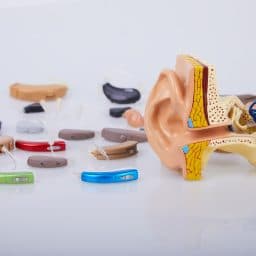When you get a new pair of hearing aids, your audiologist will walk you through how to turn them on and off, insert and remove them, and change the batteries. It’s also important to pay close attention when they tell you how to care for your batteries to ensure they work well and to avoid a dangerous accident.
How to Safely Store Hearing Aid Batteries
Below are some of the do’s and don’ts of hearing aid battery storage:
Do:
- Store your hearing aids in a container with a lid that snaps shut.
- Put the container somewhere it cannot be accessed by kids or pets.
- Ensure the batteries stay at room temperature. (Avoid leaving batteries in cars or on window sills.)
- Keep dead batteries in sealed containers until you can take them to Charleston County Recycling Center.
Don’t:
- Leave your batteries out in the open.
- Store your batteries near metal objects like keys and coins.
- Place your batteries near medications, especially if you have vision problems, as they are the same shape and size as many pills.
- Throw your dead batteries in the garbage, as this can contaminate the environment.
The Importance of Proper Battery Storage
An estimated 3,500 Americans of all ages swallow button batteries each year.
Button batteries contain mercury, silver, lithium and other heavy metals. If ingested, they can come into contact with body fluids, creating an electrical current that can burn through tissue and damage internal organs, sometimes even resulting in death. In addition, contact with a leaky battery can cause serious burns.
What to Do if a Battery Is Swallowed or Leaks
If you or someone you love, including a pet, accidentally swallows a battery, call the 24-hour National Battery Ingestion Hotline at 800-498-8666 immediately. Don’t induce vomiting, eat or drink until talking with a medical professional.
If someone’s skin comes into contact with battery acid, use a wet cloth to wipe it away, remove any clothing that may have any acid on it and run cool water over the affected area. Contact your doctor if you continue to experience pain or discoloration.
For more information about properly caring for hearing aid batteries or to talk to a hearing aid expert, call The Hearing & Balance Center today.
